Losing important data can be frustrating and devastating. Whether it’s years of family photos, client files, or business records, one system crash or accidental deletion can wipe it all out in seconds. Therefore, having reliable backup software isn’t a luxury anymore, it’s a necessity.
With so many tools available today, from free open-source options to enterprise-level suites, choosing the right backup solution can feel overwhelming. Some focus on simplicity and automation, while others give you full control over what, when, and where you back up. In this blog, we’ve rounded up the best backup software options to help you protect what matters most, without the stress.
What Is Backup Software?
Backup software is designed to copy and store your files, or entire system images, to secure locations such as external hard drives, network drives, or cloud servers. In general, there are three types:
- Local backup – saves data to physical media (external HDD, NAS).
- Cloud backup – stores data off-site on provider servers.
- Hybrid backup – combines local and cloud for flexibility and redundancy.
Use cases vary, but common scenarios include:
- Home users safeguarding family photos and documents
- Freelancers and creatives backing up project files
- Small businesses and IT teams are protecting critical servers and systems
- SaaS users preserving cloud-native data (e.g., Google Workspace, Microsoft 365)
Key Features to Look for in Backup Software
When evaluating backup tools, these core features matter:
- Scheduled and automated backups – Schedule regular backups without manual effort
- Managed recovery & file versioning – easy retrieval of past versions
- Cross-platform support – Windows, macOS, Linux, mobile
- Ransomware detection and protection
- Encryption – secure data in transit and at rest
- Full image vs. file-level backup – choose based on recovery needs
- Integration with cloud services and NAS
- Scalability – ideal for home users growing into small teams
- Reliable support – essential when disaster strikes
List of Best Backup Software of 2025
All of the tools below are reputable and widely used across personal and professional environments. Each section includes features, pricing, and a pros & cons snapshot.
1. Acronis Cyber Protect Home Office
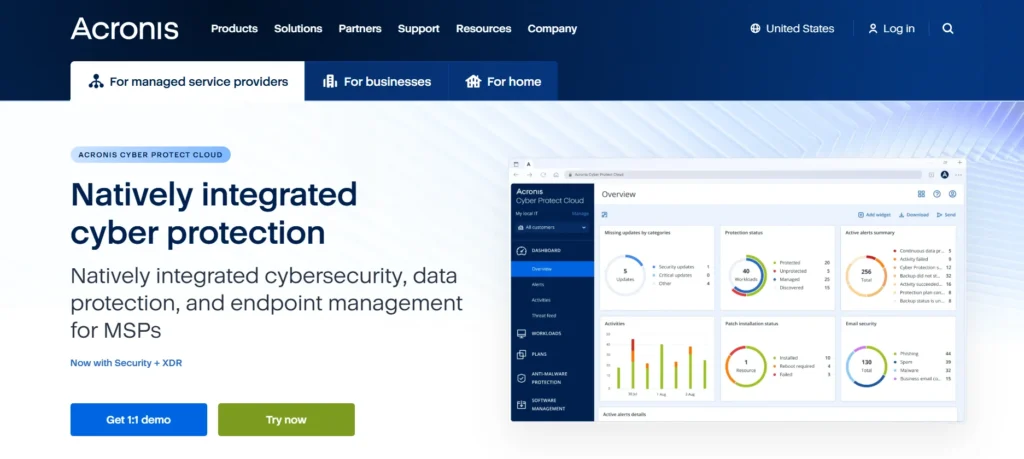
Website: https://www.acronis.com
Acronis Cyber Protect Home Office is a powerful, all-in-one backup and cybersecurity tool designed for personal users and small businesses. It combines full disk imaging, file-level backup, and real-time firewall protection in a single, easy-to-use interface. The software offers both local and cloud storage options and supports scheduling, file syncing, and full system recovery.
One of its standout features is the ability to replicate backups in multiple locations, ensuring your data is never lost. It also includes bootable media tools to help you recover from critical system failures. For users seeking a full-featured backup solution with added security, Acronis is a top-tier choice.
Offerings:
- Full disk-image and file-level backups
- Scheduled and continuous backup options
- Built-in anti-malware detection
- Cloud backup with cross-device sync
- Bootable rescue media and disk cloning
Pricing:
Acronis Cyber Protect Home Office Plans
- Essentials – $49.99/year
- Advanced – $72.99/year (includes 250GB cloud)
- Premium – $124.99/year (includes 1TB cloud, expandable to 5TB)
Acronis Cyber Protect Business Plans
- Cyber Protect Standard – From $85.00/year
- Cyber Protect Advanced – From $129.00/year
- Cyber Protect Backup Advanced – From $109.00/year
Pros and Cons:
| ✅ Pros | ⚠️ Cons |
| Full-image and file-level backups in one package | The annual subscription model may deter users who prefer lifetime deals |
| Active ransomware/malware protection built in | Cloud storage can be pricey as you scale up |
| Easy-to-use yet packed with advanced features | Full-image backups can slow down systems during execution |
| Bootable media creation for fast recovery | Uses notable system resources during heavy backup operations |
2. Backblaze
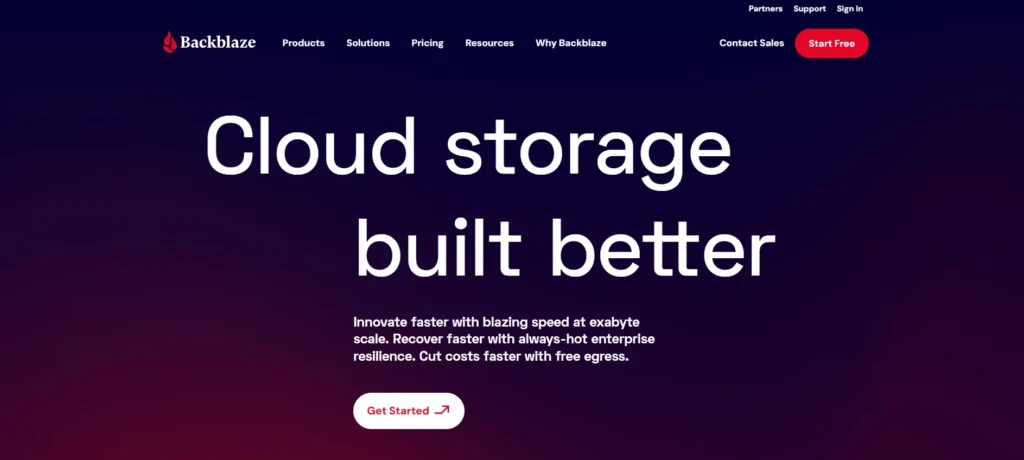
Website: https://www.backblaze.com
Backblaze is a simple, automatic cloud backup service that offers unlimited storage for a flat monthly fee. It’s designed for users who prefer a hands-off approach, once installed, it quietly runs in the background, backing up files without constant reminders or manual input.
You can back up all user data, including external drives, and restore files through a browser or by requesting a shipped USB drive. While it lacks advanced configuration settings and disk imaging features, its ease of use and affordability make it ideal for home users and freelancers. Backblaze is perfect if you want set-it-and-forget-it peace of mind with unlimited cloud storage.
Offerings:
- Unlimited cloud storage
- Continuous and scheduled file backup
- External drive backup support
- 30/60/90-day version history
- USB restore drive by mail option
Pricing:
Backblaze Backup Plans
- Personal Backup – $99/year
- Business Backup – $99/year
- Enterprise Control – Contact Sales
Backblaze B2 Cloud Storage Plans
- B2 Cloud Storage – $6 per TB/month
- B2 Overdrive – $15 per TB/month
Pros and Cons:
| ✅ Pros | ⚠️ Cons |
| Truly unlimited storage for a flat fee | No disk imaging or local backup capability |
| No complex settings, ideal for minimal setup | Limited control – e.g., no file-level exclusions or schedule options |
| Option to restore via a mailed USB drive | File version retention capped at 90 days |
| Includes backup for external drives | No integrated ransomware protection or encryption transparency |
3. EaseUS Todo Backup
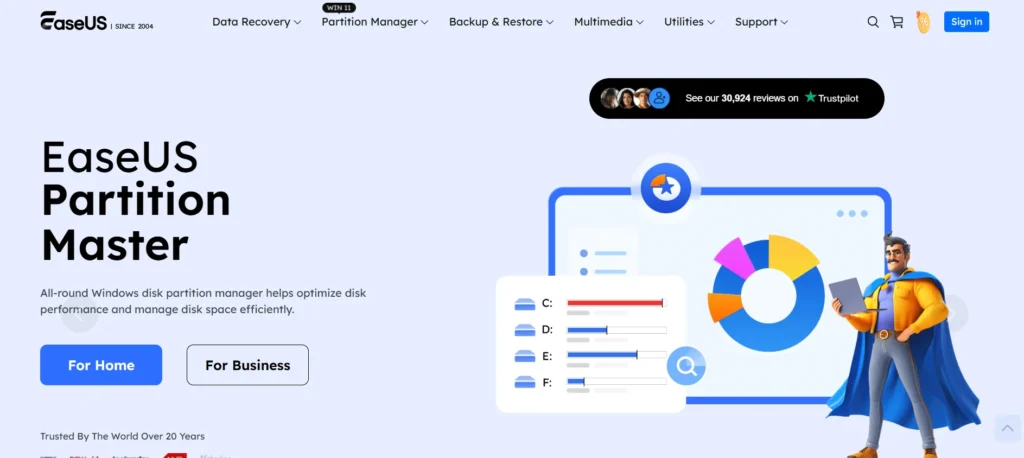
Website: https://www.easeus.com
EaseUS Todo Backup is a feature-rich backup solution that caters to both beginners and advanced users. It supports system, disk, partition, and file backups, along with full, incremental, and differential options. The software makes it easy to schedule backups and migrate OS installations to new hardware or SSDs.
Its interface is simple, but under the hood, it offers advanced tools like WinPE bootable media creation and dynamic disk compatibility. While the free version covers the basics, paid plans unlock cloud integration and more automation. Whether you’re backing up your PC at home or managing office systems, EaseUS offers great flexibility and value.
Offerings:
- System, disk, partition, and file backups
- Cloning tools for OS (SSD/HDD) migration
- Incremental and differential backups
- Scheduled backups and bootable recovery media
- Integration with third-party cloud storage (Pro version)
Pricing:
EaseUS Todo Backup Home – Windows
- Yearly – $39.95
- Perpetual – $59.95
- Lifetime Upgrades – $79.95
- Student Yearly – $23.97 (40% off)
- Student Perpetual – $35.97 (40% off)
- Student Lifetime – $47.97 (40% off)
- EaseUS Todo Backup for Mac
- Mac Version – $29.95 (discounted from $39.95)
EaseUS Todo Backup Business
- Workstation – $49/year
- Server – $199/year
- Advanced Server – $299/year
Pros and Cons:
| ✅ Pros | ⚠️ Cons |
| The free version includes disk imaging and scheduling | The user interface could be modernized |
| Cloning and scheduled backup features | The free version lacks cloud backups |
| Supports incremental and differential backups | No built-in ransomware protection |
| Bootable WinPE media included in the Pro version | Versioning is not as refined as enterprise tools |
4. IDrive
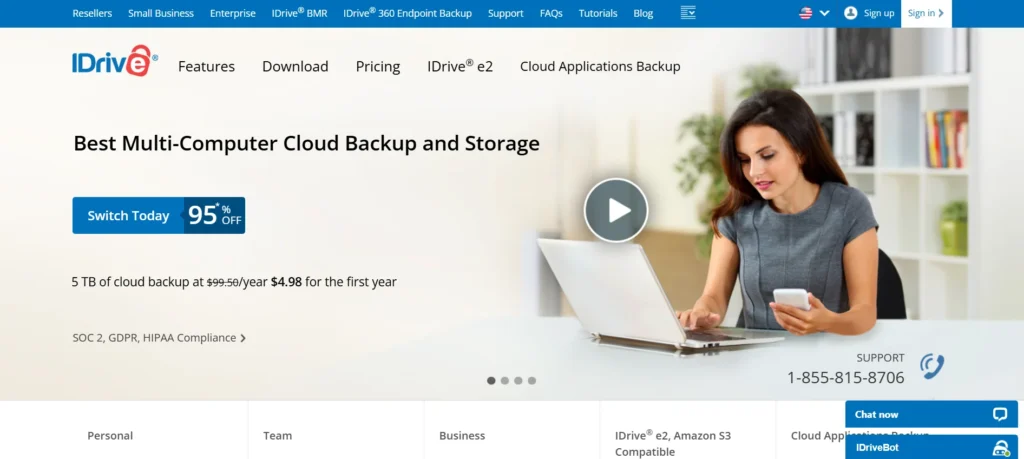
Website: https://www.idrive.com
IDrive offers a versatile hybrid backup solution, allowing you to seamlessly protect data across local drives, cloud storage, and network-attached storage (NAS). With one account, you can back up multiple devices, including PCs, Macs, mobile devices, and external drives, making it perfect for households and small businesses. It uses efficient block-level incremental backups, which reduce bandwidth usage and speed up uploads.
Security is robust, with 256-bit AES encryption plus SSL during transfers. The software also includes device-to-device sync, snapshot versioning, and NAS compatibility. For users seeking centralized control over diverse storage environments, IDrive delivers excellent value and extensive flexibility.
Offerings:
- Hybrid local and cloud backups
- Full disk image and folder backups
- Device-to-device synchronization
- Block-level incremental backups
- 256-bit AES encryption + SSL transfer
Pricing:
- Personal Plan – $99.50/year ($69.65 for first year)
- Team Plan – $99.50/year ($69.65 for first year)
- Business Plan – $99.50/year ($69.65 for first year)
- IDrive Mini – Starts at $2.95/year
- IDrive 360 – Starts at $14.95/month (for 5 devices)
- Microsoft 365 Backup – $20/seat/year
- Google Workspace Backup – $20/seat/year
- Dropbox Backup – $20/seat/year
- Box Backup – $20/seat/year
- IDrive e2 Cloud Storage – $49.50/year ($37.13 for first year, 1 TB)
Pros and Cons:
| ✅ Pros | ⚠️ Cons |
| Hybrid backup (cloud + local + NAS) | Restore version retention is limited by default without add-ons |
| Unlimited devices under one account | Upload speeds can be inconsistent |
| Multi-platform support and device sync | The web interface could be more intuitive |
| Strong encryption and efficient block-level backup | Restoration beyond the trial period incurs additional cost |
5. MSP360 (CloudBerry Backup)
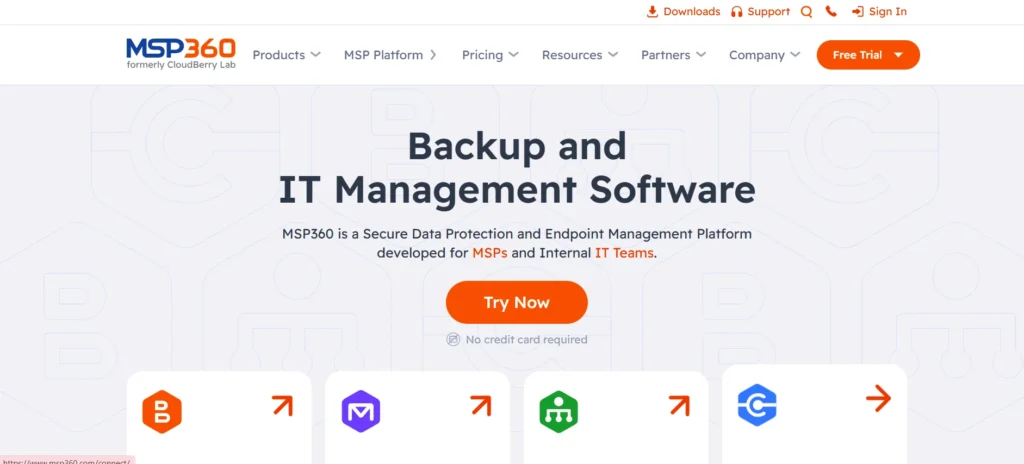
Website: https://www.msp360.com
MSP360 (formerly CloudBerry Backup) is designed for IT professionals and managed service providers who need granular control and centralized backup management. It supports backups to over 20 cloud providers, including AWS, Azure, Google Cloud, and Backblaze B2, giving you flexibility to choose or diversify your storage.
With granular scheduling, encryption, compression, and retention policies, it caters to complex backup strategies. The centralized console allows you to monitor, configure, and manage backups across numerous devices remotely. Reporting and audit logs are included for compliance tracking. If you’re managing diverse environments and multiple endpoints, MSP360 gives you enterprise-grade tools without the enterprise price.
Offerings:
- Support for 20+ cloud storage backends
- Disk-image and file-level backups
- Encryption, compression, scheduling, and retention
- Centralized multi-device management console
- Audit logs and compliance reporting tools
Pricing:
- MSP360 Free Backup – Free
- MSP360 Standalone Backup – From $19.99/year
- MSP360 Managed Backup – Get a Quote
- MSP360 M365/Google Backup (Standalone) – From $24/user/year
- MSP360 M365/Google Backup (Managed) – Get a Quote
Pros and Cons:
| ✅ Pros | ⚠️ Cons |
| Broad cloud-provider support and flexibility | Steep learning curve for casual users |
| Centralized control for multi-endpoint deployment | Cloud storage is not included, costs vary by provider |
| Encryption, compression, and custom retention abilities | Per-device pricing can be costly in larger environments |
| Audit logs and reports for compliance | UI can overwhelm non-technical users |
6. AOMEI Backupper
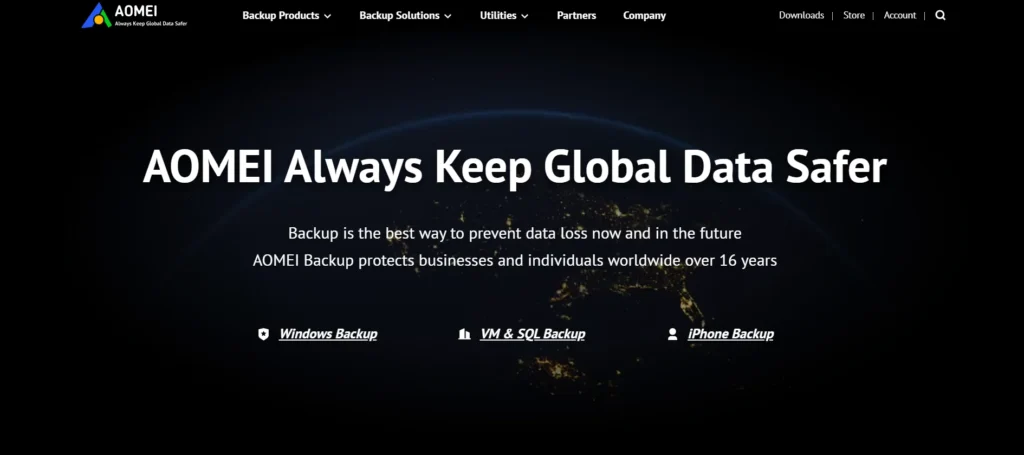
Website: https://www.aomeitech.com
AOMEI Backupper is a robust yet user-friendly backup solution ideal for both home users and small offices. Its free version offers full system, disk, partition, and file backups, plus cloning features for OS migration. The Pro edition adds advanced tools like real-time folder sync, event-triggered scheduling, and GPT/UEFI system support.
Even in its free form, it includes incremental and differential backups, bootable recovery media, and SSD partition alignment. Suitable for users who need reliable local backup and migration capabilities without a steep learning curve. It’s perfect for creating offline, bootable recovery options at no cost.
Offerings:
- System, disk, and file backups
- Incremental/differential options
- Bootable media creation
- SSD alignment & cloning
- Event-triggered backups (Pro)
Pricing:
AOMEI Backupper (PC & Server Backup)
- Standard – Free
- Professional – $39.95/year or $69.95 (lifetime)
- Workstation – $49.95/year or $79.95 (lifetime)
- Server – $149/year or $249 (lifetime)
AOMEI Cyber Backup (Centralized Backup)
- Cyber Backup (5 devices) – $99/year
- Per Windows PC – $59/year
- Per MSSQL DB – $39/year
Pros and Cons:
| ✅ Pros | ⚠️ Cons |
| Powerful free edition | No integrated cloud backup |
| Wizard-based backups/cloning | Versioning needs the Pro version |
| Supports GPT/UEFI | Limited support for server/cloud features |
7. Veeam Backup & Replication
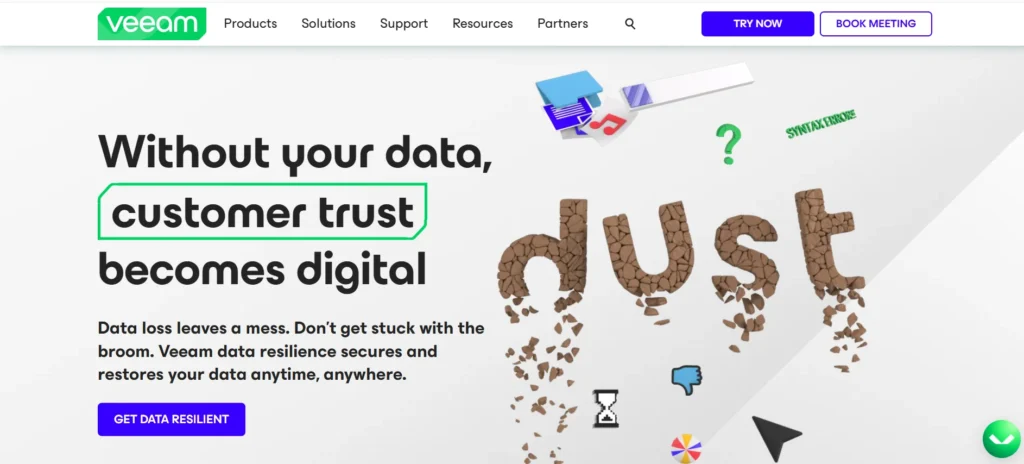
Website: https://www.veeam.com
Veeam Backup & Replication is a high-performance, enterprise-grade backup solution built for virtual machines, physical servers, and hybrid cloud environments. It’s known for instant VM recovery, advanced replication, and granular restore features that reduce downtime significantly.
Veeam supports VMware, Hyper-V, AWS, Microsoft Azure, and Google Cloud platforms. It offers centralized backup management, ransomware protection, and compliance-ready reporting. Though it requires some technical knowledge, it’s a favorite among IT teams for its reliability and scalability. Businesses handling large-scale workloads or sensitive data can benefit greatly from Veeam’s robust disaster recovery tools.
Offerings:
- VM, physical and cloud backups
- Instant VM recovery
- WAN acceleration & replication
- Tape and cloud archiving
- Reporting and audit tools
Pros and Cons:
| ✅ Pros | ⚠️ Cons |
| Enterprise-level features & scalability | Complex to configure; needs expert administration |
| Instant restores and replication | High price for full deployment |
| Ideal for hybrid and cloud setups | Overkill for small businesses |
8. pCloud Backup
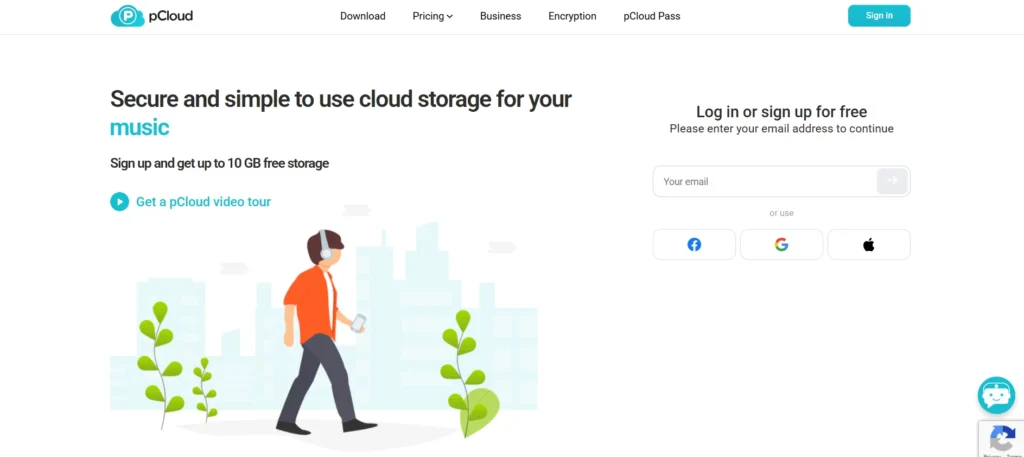
Website: https://www.pcloud.com
pCloud Backup is a lightweight, user-friendly backup software that allows users to back up specific folders from their computers to secure cloud storage. Designed for simplicity, it offers automatic and continuous backups, strong TLS/SSL encryption, and file versioning.
pCloud stands out by offering optional zero-knowledge encryption through its “Crypto” add-on. It works well for individuals and freelancers who want basic, off-site protection for personal or work files. While it lacks full-system imaging, it’s a solid choice for backing up documents, media, and project folders without complex setup.
Offerings:
- Continuous folder backup
- 256-bit TLS Encryption
- Versioning for 30–365 days
- Cross-platform clients
- Optional Crypto: zero-knowledge encryption
Pricing:
- Premium 500 GB – $49.99/year
- Premium Plus 2 TB – $99.99/year
- Ultra 10 TB – $199.99/year
Pros and Cons:
| ✅ Pros | ⚠️ Cons |
| Affordable and easy setup | No imaging or local backup |
| Strong encryption with Crypto | Limited to the pCloud ecosystem |
| Selective version history | No recovery media or ransomware protection |
9. Macrium Reflect
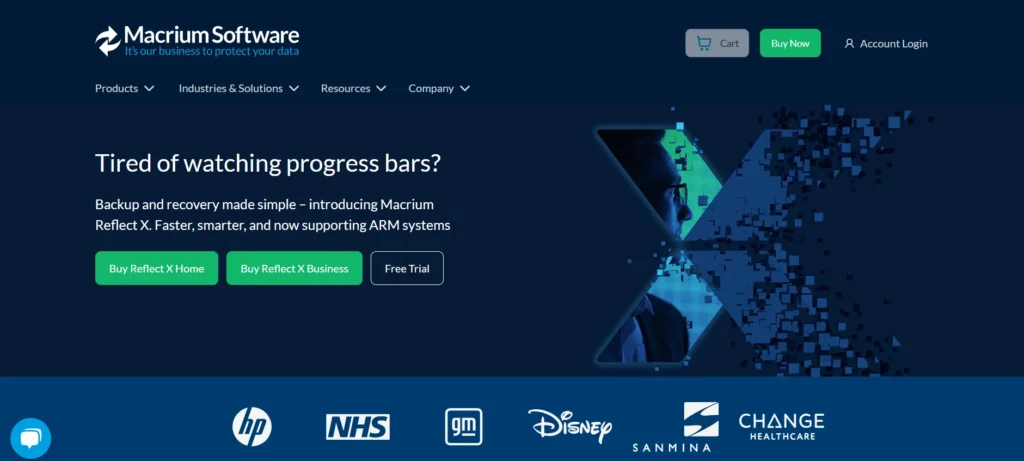
Website: https://www.macrium.com
Macrium Reflect is a trusted backup and disk imaging tool well-suited for both personal and professional use. It supports full, differential, and incremental backups, with rapid recovery using its Rapid Delta Restore (RDR) technology. The software allows you to create bootable recovery media, schedule tasks, and encrypt backups.
The free edition covers basic imaging and cloning, while paid versions add ransomware protection and advanced retention rules. Macrium Reflect is known for its reliability and fast recovery times, making it ideal for users who need solid protection for their entire system.
Offerings:
- Full, differential, incremental imaging
- Bootable rescue media
- RDR for fast restore
- Encryption via ransomware add-on
- Scheduling and cloning tools
Pricing:
- Reflect X Standalone Workstation (1 Year) – $65.00
- Reflect X Standalone Server (1 Year) – $275.00
- Reflect X Standalone Workstation (3 Year) – $166.00
- Reflect X Standalone Server (3 Year) – $701.00
- Reflect X Standalone Workstation (5 Year) – $227.50
- Reflect X Standalone Server (5 Year) – $962.50
Pros and Cons:
| ✅ Pros | ⚠️ Cons |
| Excellent imaging performance | No built-in cloud sync |
| Free version available | Guardian ransomware add-on costs extra |
| Great rescue media & restore tools | Windows-only |
10. SpinBackup
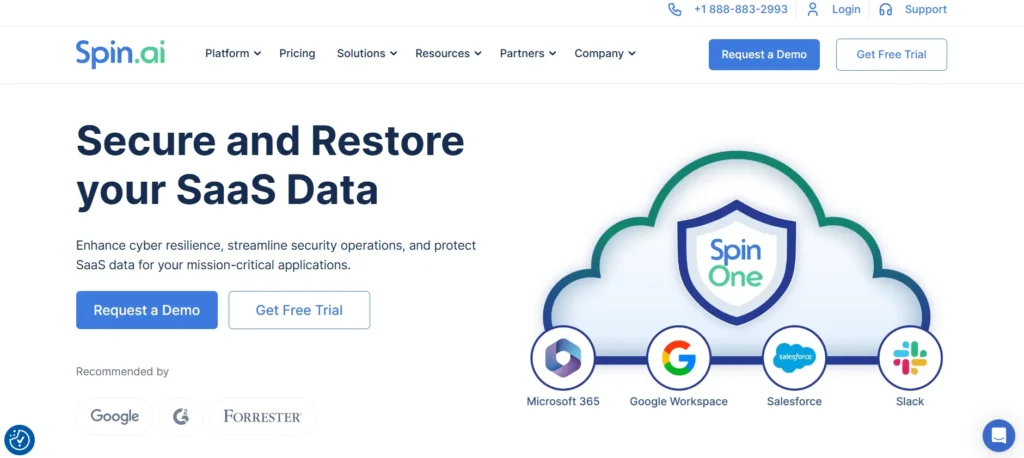
Website: https://www.spinbackup.com
SpinBackup is a specialized cloud-to-cloud backup solution tailored for Google Workspace and Microsoft 365. It performs automated daily backups of Gmail, Drive, Contacts, and more, protecting your business from ransomware, accidental deletions, or insider threats.
SpinBackup includes cybersecurity tools like anomaly detection, risk analysis, and app access control. With detailed reporting and item-level restore, it’s perfect for businesses that rely heavily on SaaS platforms. It does not support desktop or local backup, but for cloud app data protection, it’s among the best in the market.
Offerings:
- SaaS data backup (Drive, Gmail, Calendars, Contacts)
- Daily automated backups
- Ransomware and insider threat detection
- Item-level restore and recovery
- Audit logs and compliance reporting
Pricing:
- SpinBackup – $3/user/month (SaaS Backup & Disaster Recovery)
Pros and Cons:
| ✅ Pros | ⚠️ Cons |
| SaaS-specific recovery tools | SaaS-only (no desktop backups) |
| Strong security auditing | Costs grow with user count and data volume |
| Fast granular restores | Lacks support for hybrid or endpoint backups |
11. Druva inSync
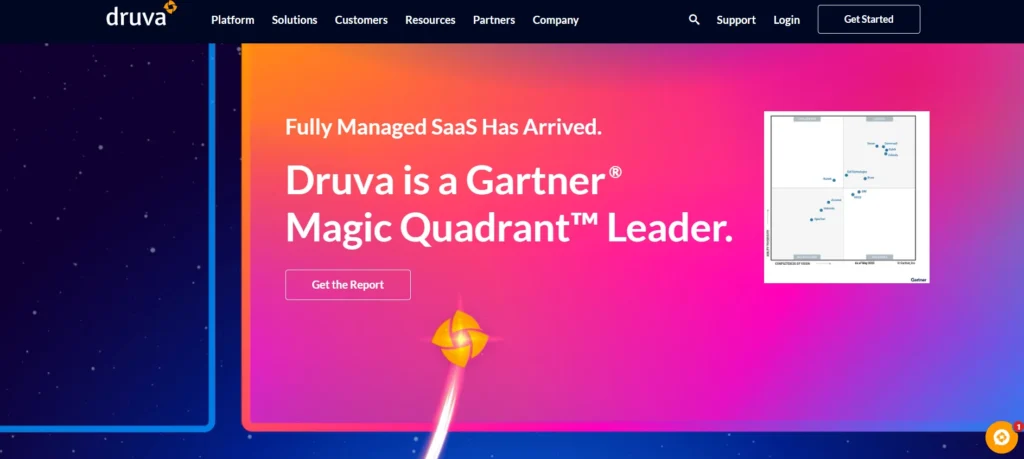
Website: https://www.druva.com
Druva inSync is a cloud-native backup solution designed specifically for endpoints, SaaS applications, and hybrid workforces. It provides seamless protection for Microsoft 365, Google Workspace, endpoints, and cloud workloads, all managed via a single dashboard. With built-in eDiscovery, compliance, and data loss prevention features, it’s ideal for enterprises needing strict data governance.
InSync automatically backs up critical data while enabling granular restore and legal hold options. Since it’s SaaS-based, there’s no infrastructure to maintain, making it a cost-effective choice for large distributed teams and regulated industries.
Offerings:
- Endpoint, server, and SaaS backup
- eDiscovery and legal hold
- Data encryption and audit trails
- Centralized dashboard
- Retention policy controls
Pros and Cons:
| ✅ Pros | ⚠️ Cons |
| Compliance-oriented with governance tools | Designed for enterprise, expensive for small setups |
| Scalable across endpoints and SaaS | Complexity may require expert IT management |
12. Duplicati
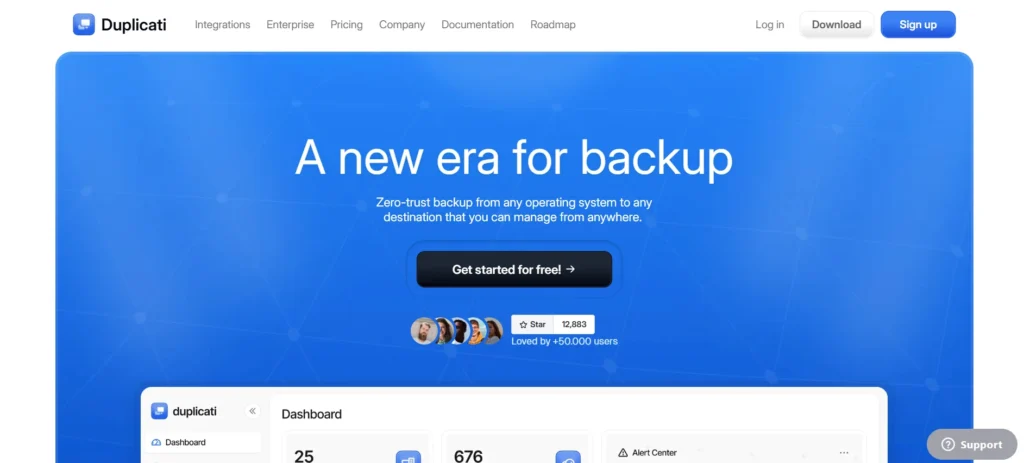
Website: https://www.duplicati.com
Duplicati is a free, open-source backup software offering encrypted, incremental backups to a variety of cloud storage providers, including Google Drive, Dropbox, OneDrive, Amazon S3, and more. It features a web-based interface that allows for easy backup scheduling, versioning, and restoration.
Duplicati is ideal for tech-savvy individuals who want full control over how and where their data is stored. It uses strong AES-256 encryption and deduplication to minimize space usage. While there’s no official support, its active community and documentation make it highly accessible for personal or small-scale professional use.
Offerings:
- Encrypted backups to various cloud endpoints
- Incremental backups with deduplication
- Scheduling and backup versioning
- Web-based interface
- Cross-platform (Windows, macOS, Linux)
Pricing:
- Free – $0/user/month
- Duplicati Pro – $5/machine/month (billed yearly)
- Enterprise – Custom pricing
Pros and Cons:
| ✅ Pros | ⚠️ Cons |
| Free with no limitations | Interfaces and setup are geared toward technical users |
| Strong encryption and deduplication | No official support |
| Supports multiple cloud backends | UI can feel outdated or clunky |
13. Cobian Backup
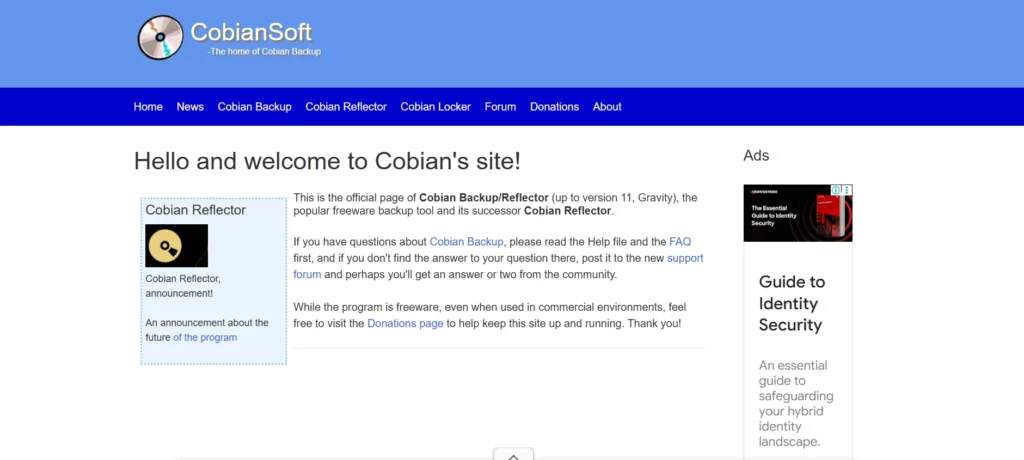
Website: https://www.cobiansoft.com
Cobian Backup is a lightweight, Windows-only tool that supports scheduled backups to local drives, external storage, or network shares. It doesn’t include cloud or imaging capabilities but offers a solid, no-frills option for users who want reliable file and folder backups.
Cobian supports incremental and differential backup types, along with optional encryption and compression. Though it’s not under active development by the original creator, newer open-source forks have continued the project. It’s best for users who are comfortable managing their backups manually and want complete control without automation or cloud dependency.
Offerings:
- Scheduled backups to local or network drives
- Compression and AES-256 encryption
- Incremental, differential, and full modes
- Scripting and advanced scheduling options
Pricing:
- Free
Pros and Cons:
| ✅ Pros | ⚠️ Cons |
| Free and lightweight | No cloud backup or disk imaging |
| Good scheduling flexibility | User interface is dated |
| Encryption available | Not actively developed by original author |
14. NovaBACKUP
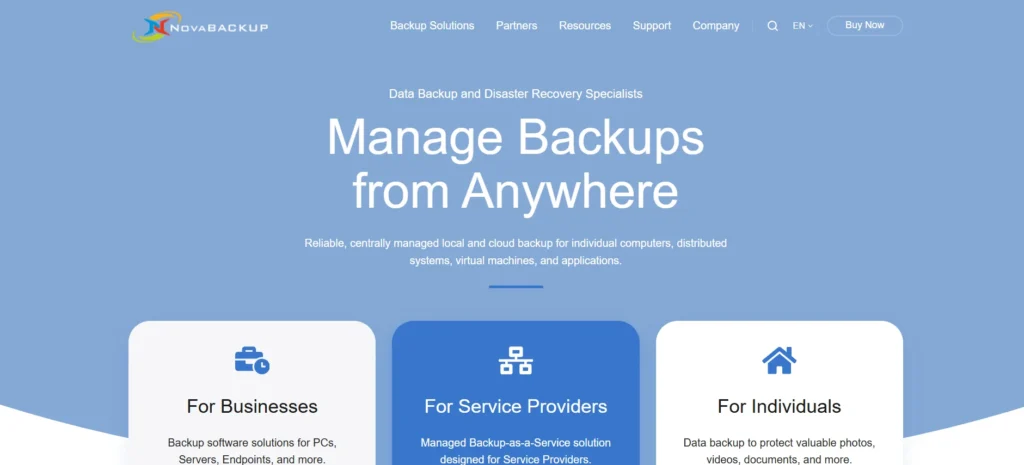
Website: https://www.novabackup.com
NovaBACKUP is a reliable backup solution for small businesses and IT professionals that supports local, NAS, and cloud storage. It offers disk imaging, file-level backups, bare-metal restore, and even SQL and Exchange backup (in business plans). The software includes built-in ransomware protection and retention scheduling.
While the UI isn’t the most modern, it’s functional and comes with U.S.-based technical support. NovaBACKUP is ideal for those needing Windows-based backup with compliance-ready features and optional cloud add-ons.
Offerings:
- File and image backups
- Incremental/differential scheduling
- Disk cloning and bare-metal recovery
- NAS and cloud backup options
- Built-in ransomware protection
Pros and Cons:
| ✅ Pros | ⚠️ Cons |
| Hybrid backups with NAS/cloud | Windows-only |
| Bare-metal recovery supported | UI may need modernization |
| Technical support included | The server version is expensive for small teams |
15. Iperius Backup
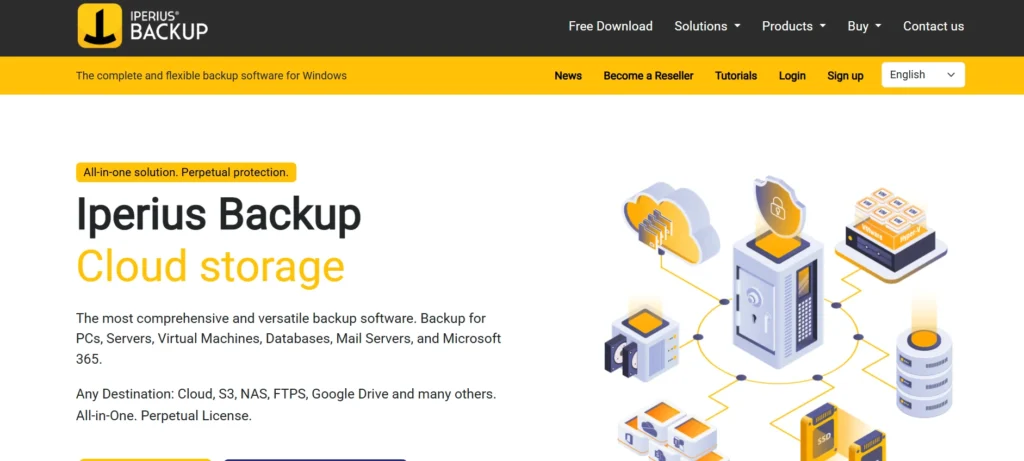
Website: https://www.iperiusbackup.com
Iperius Backup is a flexible and scalable solution for Windows systems that supports file, folder, disk image, database, and virtual machine backups. It can back up to cloud storage (Google Drive, Dropbox, OneDrive, Amazon S3), FTP servers, and NAS devices.
Iperius supports VSS technology for open file backups, along with scheduling, compression, and military-grade encryption. Advanced editions also support VMware, Hyper-V, and MS SQL/Exchange backups. It’s suitable for both individuals and businesses needing highly customizable backup routines.
Offerings:
- File/folder/disk image backups
- Support for cloud & FTP storage
- AES-256 encryption and ZIP compression
- VMware, Hyper-V, SQL, and Exchange support
- Open the file backup with VSS
Pricing:
- Basic – €59
- Advanced DB – €199
- Advanced 365 – €199
- Advanced VM – €219
- Full – €299
Pros and Cons:
| ✅ Pros | ⚠️ Cons |
| Wide range of backup destinations | UI can be confusing for beginners |
| Supports VMs, databases, and cloud | Premium features are locked behind higher pricing |
| Free version includes core local backup features | Limited documentation for advanced configurations |
Conclusion
Data loss can strike unexpectedly, making reliable backup software an essential part of any digital setup. From all-in-one solutions like Acronis and IDrive to simple, automated options like Backblaze, there’s something for everyone.
If you’re an IT professional, tools like MSP360 and Veeam provide granular control and scalability. For budget-conscious or tech-savvy users, Duplicati and Cobian deliver powerful features at no cost. Whether you’re protecting personal files or managing enterprise data, choosing the right tool ensures peace of mind and quick recovery when you need it most.
FAQs
1. Which backup software offers unlimited cloud storage?
Backblaze offers unlimited cloud backup for a flat fee per device.
2. Is there free backup software for Windows users?
Yes, Macrium Reflect Free, AOMEI Backupper Standard, and Duplicati are great free options.
3. Can I back up my Google Workspace with these tools?
Yes, SpinBackup and Druva inSync specialize in backing up Google Workspace data.
4. What’s the best option for enterprise backup?
Veeam and MSP360 offer robust features tailored for large-scale or business environments.
5. Do any of these tools include ransomware protection?
Yes, Acronis Cyber Protect, NovaBACKUP, and Macrium Reflect (with Guardian) include ransomware protection.
 Get 50% off on Vault theme. Limited time offer!
Get 50% off on Vault theme. Limited time offer!